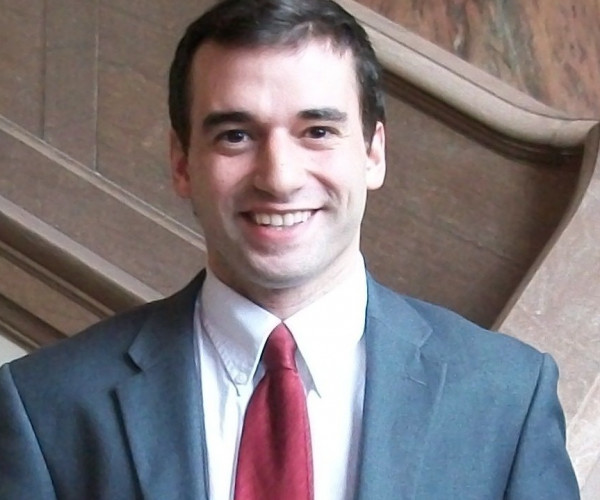Penn Law PI fellow works to “ban the box” in Colorado
When job applicants are forced to check the box that asks if they have a criminal record, Jack Regenbogen L’15 explained, that application often “ends up in the garbage bin.”
Regenbogen is trying to change that. As a TPIC postgraduate fellowship recipient, he’s spending his fellowship year launching the Colorado Center on Law and Policy’s Second Chance Project. The goal of the initiative is to help people who have records receive an interview before they’d be subjected to a criminal background check by “banning the box” — eliminating the box on job applications that ask if the applicant has a criminal record.
“Jack is helping people who have already paid a heavy price for their crimes not be prevented for getting a fresh start,” said Arlene Rivera Finkelstein, Associate Dean and Executive Director of the Toll Public Interest Center. “By focusing on the collateral consequences of criminal convictions, Jack’s project is a game-changer that can have a tremendous impact on people’s lives.”
“By passing the ban the box law, we’re hoping to give people a second chance,” said Regenbogen. People with records are disproportionately more likely to become homeless, have food instability, and have income instability.
A ban the box reform wouldn’t prevent employers from conducting a background check, Regenbogen noted, and wouldn’t instruct them on what they could and couldn’t consider — but it would allow people to get their foot in the door and have a fair chance to impress employers on the merits of their applications.
“All the data and research that’s been conducted on these kind of reforms has shown that having a face-to-face interaction really goes a long way in terms of significantly boosting employment rates for people with records,” he said.
The issue is one that’s being talked about around the country. President Obama recently issued an executive order that essentially enacted ban the box for federal employers, and some in Congress are interested in expanding that reform to also include contractors.
Colorado is currently one of 19 states that have some kind of ban the box legislation, but Colorado’s law only covers state employment, not the private sector. Only seven states have private sector ban the box laws.
“We’re hoping that by the end of my project,” Regenbogen said, “Colorado becomes the eighth.”
With the Second Chance Project, Regenbogen is working to get a “responsible re-entry” bill passed at through Colorado’s state legislature. He also works with people “in the trenches” on record sealing cases — which allow people to gain better access housing and employment.
In Colorado, it’s difficult to have a record sealed, and it can only be done for an arrest or for a few misdemeanor convictions. “It doesn’t matter if your conviction is 40, 50 years old,” said Regenbogen, “It’s still something that’s going to come up on a criminal background check, and something that an employer will hold against an applicant.”
He also notes that research has shown that criminal databases are often inaccurate. They frequently don’t show when charges are dropped or deferred, leaving those changes on records that can be accessed by employers.
“It’s incredibly tough for people to rein in this paper trail,” said Regenbogen. “This scarlet letter, really.”
Through the Second Chance Project, he’s also working to increase awareness of the collateral consequences of involvement with the criminal justice system. In Colorado, records are never erased. Unless a person obtains legal help to get records sealed, arrests will still show up on a criminal record.
And because arrest records aren’t good indicators of criminal behavior, the Equal Employment Opportunity Commission advises employers not to inquire about arrest records. Yet they often do.
“I have always firmly believed that making a mistake shouldn’t render someone unemployable for life,” said Regenbogen.
As a student at Penn Law, he worked at Philadelphia Legal Assistance, Community Legal Services, and interned with the Homeless Advocacy Project. Doing pro bono work, he represented a client who was homeless because he had an inaccurate criminal record — he had a common first and last name, and could not find housing because of someone else’s criminal record.
Regenbogen chose to pursue a public interest career, and he credits the support of TPIC and his postgraduate fellowship with allowing him to launch the Second Chance Project.
“This is my life’s passion,” he said. “To be able to start my career doing exactly what I’d like to be doing, and to be able to learn so much and have access to all the resources that Penn Law provides — I couldn’t be luckier. I’m so grateful for this opportunity.”





